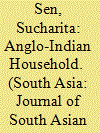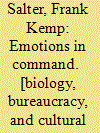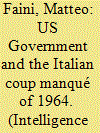|
|
|
Sort Order |
|
|
|
Items / Page
|
|
|
|
|
|
|
| Srl | Item |
| 1 |
ID:
188404


|
|
|
|
|
| Summary/Abstract |
This article subjects the personal narratives about the domestic spaces of expatriate Britons in India, or Anglo-Indians, to close scrutiny. The households of expatriate Britons were intended to mirror the racial distance of the formal imperial spaces, like clubs, parks and gymkhanas. But far from being an extension of public spaces that separated the colonised and the coloniser, the households embodied the multiplicity of social spaces. Interpersonal relations in these households complicated this bifurcation substantially. Space played a crucial role in the construction of a hierarchy–intimacy paradox in the households, where interracial intimacies existed in tandem with imperial hierarchies.
|
|
|
|
|
|
|
|
|
|
|
|
|
|
|
|
| 2 |
ID:
081081


|
|
|
|
|
| Publication |
New Brunswick, Transaction Publishers, 2008.
|
| Description |
xli, 527p.
|
| Standard Number |
9781412806718
|
|
|
|
|
|
|
|
|
|
|
|
Copies: C:1/I:0,R:0,Q:0
Circulation
| Accession# | Call# | Current Location | Status | Policy | Location |
| 053187 | 303.34/SAL 053187 | Main | On Shelf | General | |
|
|
|
|
| 3 |
ID:
193144


|
|
|
|
|
| Summary/Abstract |
In this article, we examine the Hungarian and Turkish responses to the EU’s handling of the 2015 refugee “crisis” through a postcolonial feminist IR framework. Drawing on hypermasculinity, we argue that both countries utilise migration to overcome their postcolonial and masculine anxieties by confronting their positions within the international hierarchies. Our examination of policy statements and speeches by Viktor Orbán and Recep Tayyip Erdoğan between 2015 and 2016 reveals three masculinised responses. First, both leaders portray themselves as acting out of paternal authority, while painting the EU as weak or inhumane. Second, they depict the EU as incompetent and their countries as competent providers of security. Third, they present themselves as protectors of European values, and the EU as in need of protection. These rhetorics suggest that both leaders used the “crisis” to challenge the current international hierarchy. Despite this, we argue that they are only concerned with their countries’ rankings within the hierarchy, not the system itself. Our postcolonial feminist reading of the “crisis” reveals that these masculinised framings are in fact counterproductive and only serve to confirm both Hungary and Turkey’s positions at the bottom of the international hierarchies, and their subordination to the EU as the EU’s others.
|
|
|
|
|
|
|
|
|
|
|
|
|
|
|
|
| 4 |
ID:
149298


|
|
|
|
|
| Summary/Abstract |
In the summer of 1964, Italian security forces and the President of the Republic attempted to remove the US-backed Italian center-left government. The attempt did not succeed, but the threat to do so was used to curtail the government’s reformist program. This article shows that the State Department and the CIA misunderstood the plans of the Italian President and security officers, dismissing the possibility of a forceful removal of the center-left, despite having a long-standing hierarchical relationship with Italian intelligence. US officials failed because of poor analytic tradecraft and because of two unintended consequences of international intelligence hierarchies: an excessive reliance on liaison over penetrations and the increased freedom of maneuver of Italian intelligence when faced with multiple, competing principals.
|
|
|
|
|
|
|
|
|
|
|
|
|
|
|
|
|
|
|
|
|